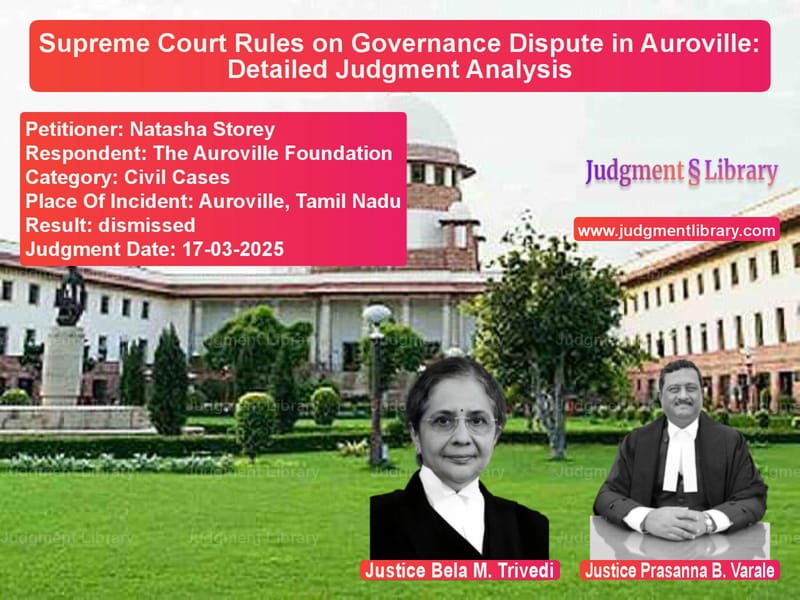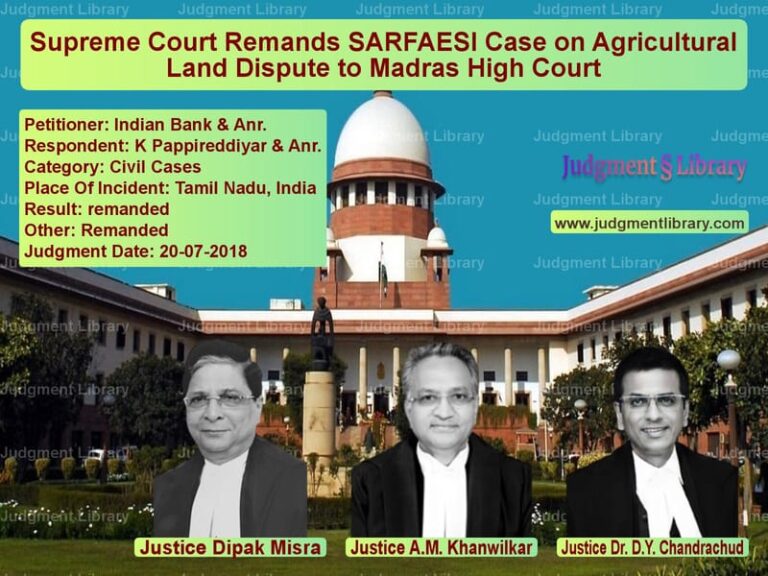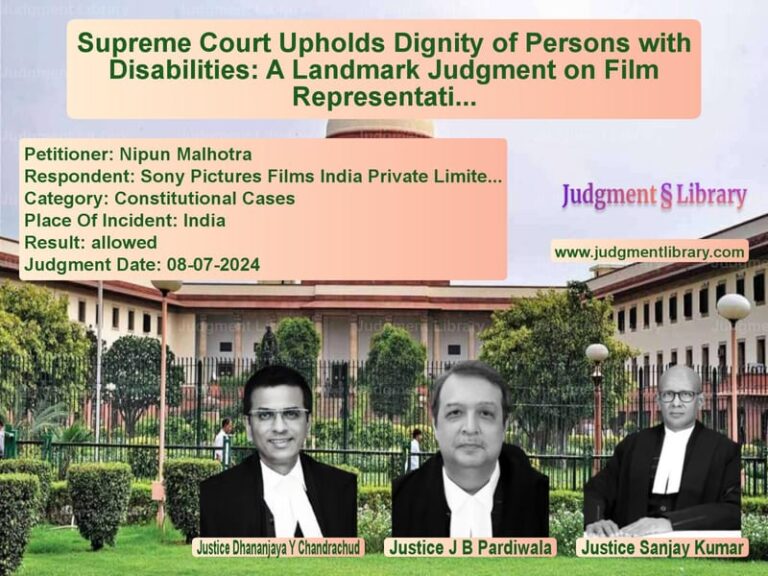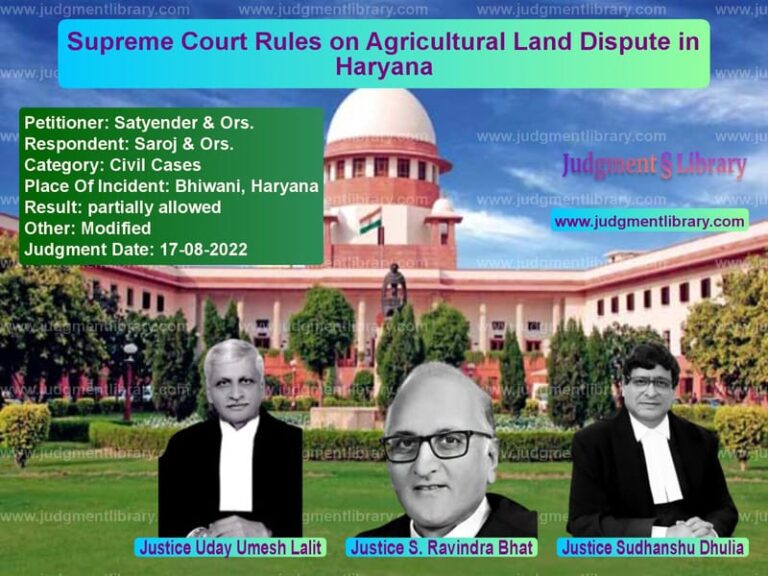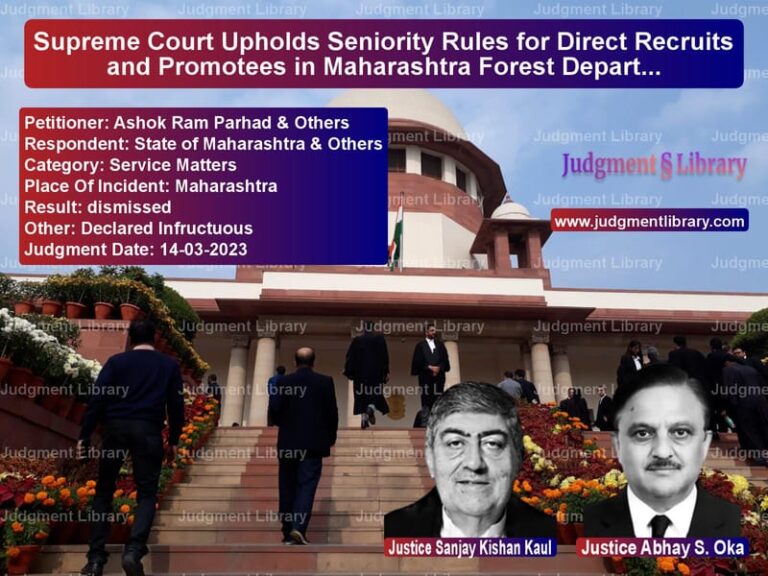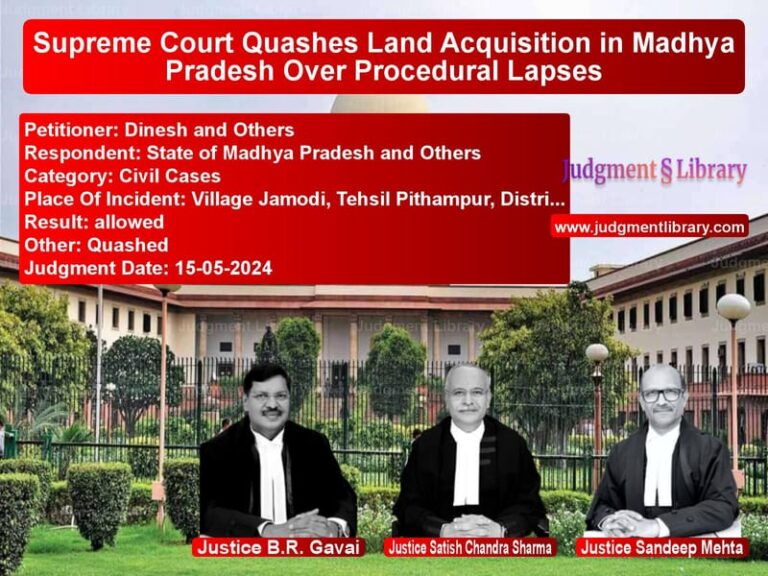Supreme Court Rules on Governance Dispute in Auroville: Detailed Judgment Analysis
The Supreme Court of India recently delivered a significant ruling on the governance of the Auroville Foundation, resolving a long-standing dispute over the authority of the Governing Board versus the Residents’ Assembly. The case, filed by Natasha Storey against The Auroville Foundation, questioned the validity of Standing Order No. 01/2022, which restructured administrative powers within Auroville. The ruling reaffirmed the legal standing of the Governing Board in managing Auroville’s affairs and clarified the limitations of the Residents’ Assembly’s decision-making power.
This case serves as a crucial legal precedent regarding township governance and the extent of statutory control over community-driven initiatives. The judgment underscores the importance of adhering to legislative frameworks while balancing participatory governance.
Background of the Case
Auroville was conceived by Mirra Alfassa (The Mother) in 1965 as an international township dedicated to human unity. Supported by UNESCO and the Government of India, the township was formally structured under the Auroville Foundation Act, 1988. The act established three key entities to oversee Auroville:
- The Governing Board: Responsible for administration and development.
- The Residents’ Assembly: Comprised of Auroville residents, providing recommendations on governance matters.
- The International Advisory Council: Offering guidance on international collaboration and governance.
The legal dispute arose when The Auroville Foundation issued Standing Order No. 01/2022, altering the nomination process for the Auroville Town Development Council (ATDC). The new order granted the Governing Board exclusive authority over council appointments, reducing the Residents’ Assembly’s role in the process.
Petitioner’s Arguments
Representing the Residents’ Assembly, Natasha Storey challenged the standing order on the following grounds:
- The order violated the Auroville Foundation Act by limiting the Residents’ Assembly’s decision-making power.
- The act envisioned a collaborative governance model, which the order disregarded.
- The new structure undermined community-driven governance by centralizing control with the Governing Board.
Her counsel contended, “The principles of Auroville’s founding are rooted in participatory governance. By unilaterally issuing Standing Order No. 01/2022, the Governing Board has overstepped its jurisdiction, undermining the democratic foundation of Auroville.”
Respondent’s Arguments
The Auroville Foundation defended the order, arguing:
- The Governing Board’s authority is clearly defined under Section 11(3) of the Auroville Foundation Act.
- The Residents’ Assembly serves an advisory function and cannot dictate administrative decisions.
- The restructuring was necessary for the effective implementation of the Auroville Master Plan.
The foundation’s counsel stated, “While community participation is valuable, legal governance must be upheld. The Governing Board’s authority is statutory and not subject to community override.”
Supreme Court’s Observations
The Supreme Court, led by Justices Bela M. Trivedi and Prasanna B. Varale, carefully analyzed the Auroville Foundation Act and previous legal precedents. The Court made several key observations:
“The Auroville Foundation Act, 1988, vests administrative authority in the Governing Board. The Residents’ Assembly, while a critical stakeholder, cannot supersede the board’s statutory powers.”
The Court also highlighted procedural concerns regarding the petitioner’s approach:
“Litigants must present a full and accurate account of previous proceedings. Suppressing material facts undermines judicial integrity and may lead to dismissal.”
The Court emphasized that governance decisions must align with legal mandates and not be dictated by communal interpretations of self-rule.
Key Legal Takeaways
- Supremacy of the Governing Board: The ruling clarifies that statutory authorities hold precedence in governance matters.
- Limits of Community Governance: While participatory decision-making is encouraged, legal frameworks cannot be overridden.
- Judicial Accountability: The Court reinforced the importance of full disclosure in legal proceedings.
Final Judgment
The Supreme Court upheld the validity of Standing Order No. 01/2022, dismissing Natasha Storey’s petition. The ruling confirmed the Governing Board’s authority in administering Auroville while acknowledging the advisory role of the Residents’ Assembly.
Read also: https://judgmentlibrary.com/supreme-court-rules-on-lease-agreement-dispute-dda-vs-s-g-g-towers/
“The challenge to Standing Order No. 01/2022 is without merit. The petition is dismissed with no order as to costs.”
The judgment reinforces the structured governance of Auroville and prevents administrative disruptions caused by legal ambiguities. This case will serve as a reference point for future governance-related disputes in community-driven initiatives.
Petitioner Name: Natasha Storey.Respondent Name: The Auroville Foundation.Judgment By: Justice Bela M. Trivedi, Justice Prasanna B. Varale.Place Of Incident: Auroville, Tamil Nadu.Judgment Date: 17-03-2025.
Don’t miss out on the full details! Download the complete judgment in PDF format below and gain valuable insights instantly!
Download Judgment: natasha-storey-vs-the-auroville-founda-supreme-court-of-india-judgment-dated-17-03-2025.pdf
Directly Download Judgment: Directly download this Judgment
See all petitions in Contract Disputes
See all petitions in Property Disputes
See all petitions in Legal Malpractice
See all petitions in Judgment by Bela M. Trivedi
See all petitions in Judgment by Prasanna Bhalachandra Varale
See all petitions in dismissed
See all petitions in supreme court of India judgments March 2025
See all petitions in 2025 judgments
See all posts in Civil Cases Category
See all allowed petitions in Civil Cases Category
See all Dismissed petitions in Civil Cases Category
See all partially allowed petitions in Civil Cases Category

